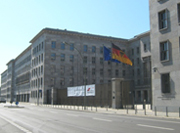VIPsight - January 2015
COMPANIES
The Federal Finance Ministry sets thousand million Euro fine on nuclear power station operator
 The day before Christmas brought a thousand million Euro package to the Christmas stocking of German Federal Finance Minister Wolfgang Schäuble (CDU), in the form of the provisional tax on nuclear-generated energy that the generating station operators must continue paying. The Finance Ministry forecasts that the revenue of some 2.7 thousand million Euros, almost halves the envisaged loss of 6.5 thousand million Euros forecast for 2014. The judgment handed down and now published is the latest in the never-ending legal stand-off between Berlin and those operating nuclear power generating stations. A tax on the nuclear fuel that is used to generate commercial power was introduced in the German Federal Republic effective 1 January, 2011, and is due to expire at the end of 2016. It is charged to the operators of nuclear power stations and is based on of the uranium and plutonium they use. The operators deem that the tax is illegitimate and have lodged an appeal against it. The ruling of first instance stated that they were liable for payment of the tax and Schäuble had to revise his figures since they had been calculated on the basis of a shortfall of thousands of millions of Euros. Furthermore, the Hamburg financial tribunal turned down the providers’ appeal for exemption from payment until the Federal Constitutional Court motivated a ruling by judges and the European Court of Justice on analyses on the constitutional and legal status of the fuel tax. The issue of the legitimacy of the tax has, since 2013, been in the hands of the Federal Constitutional Court in Karlsruhe, and of the European Court of justice in Luxemburg.
The day before Christmas brought a thousand million Euro package to the Christmas stocking of German Federal Finance Minister Wolfgang Schäuble (CDU), in the form of the provisional tax on nuclear-generated energy that the generating station operators must continue paying. The Finance Ministry forecasts that the revenue of some 2.7 thousand million Euros, almost halves the envisaged loss of 6.5 thousand million Euros forecast for 2014. The judgment handed down and now published is the latest in the never-ending legal stand-off between Berlin and those operating nuclear power generating stations. A tax on the nuclear fuel that is used to generate commercial power was introduced in the German Federal Republic effective 1 January, 2011, and is due to expire at the end of 2016. It is charged to the operators of nuclear power stations and is based on of the uranium and plutonium they use. The operators deem that the tax is illegitimate and have lodged an appeal against it. The ruling of first instance stated that they were liable for payment of the tax and Schäuble had to revise his figures since they had been calculated on the basis of a shortfall of thousands of millions of Euros. Furthermore, the Hamburg financial tribunal turned down the providers’ appeal for exemption from payment until the Federal Constitutional Court motivated a ruling by judges and the European Court of Justice on analyses on the constitutional and legal status of the fuel tax. The issue of the legitimacy of the tax has, since 2013, been in the hands of the Federal Constitutional Court in Karlsruhe, and of the European Court of justice in Luxemburg.
Stabilus: Lower indebtedness
Stabilus S.A. has posted record numbers for fiscal year 2013/14. As of the end of the year in September, the automotive industry supplier recorded an increase in turnover of more than 10 percent to 507 million Euros. Adjusted EBIT was also up by some 10 percent to around 65 million Euros. Despite a loss of 16 million Euros last September the SDax-listed company has turned the situation round and now boasts a profit of 10 million Euros with which the company intends further reducing its net indebtedness. Furthermore, Stabilus management has announced its intention of distributing a dividend of between 20 and 40 percent of the profit to shareholders.
H & R: Oil price drop changes forecast
The slump in crude oil prices in December obliged specialty chemicals company H & R WASAG AG to revise its forecast for the 2014 fiscal year. The Prime Standard-listed company had expected an EBITDA in excess of the previous year’s 33 million Euros, whereas now, with the effects of the changes in the price of oil making themselves felt in the fourth quarter, EBITDA is forecast at between 29 and 33 million Euros, despite the positive turnover. If the price of crude remains stable in the coming months oil 2014 will affect the fourth quarter operating profit despite good sales figures. Again, if the crude oil price remains stable in the coming months, the board of management expects the situation to improve.
Nanogate: More demand, more capacity
The provider of high-performance interfaces Nanogate AG 2014 completed the construction of its hi-skill centre in December, earlier than expected, thus increasing its production capacity of glazing components more than two-fold. This stage had originally been envisaged for the end of the first quarter of 2015. The Entry Standard-listed company is continuing pursuit of its investment strategy preparing for a strong demand in 2D and 3D plastics with multifunctional surfaces. These elements with their characteristic shine, are scratch resistance and suitably lightweight to replace heavier components in glass in the automotive industry. For 2015, the group intends forging ahead in broadening its capacity for high-quality metal coatings and opening a hi-skill centre where coatings with certain specific energy-related properties will be applied to heat exchangers.















